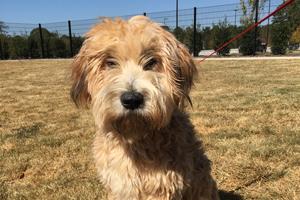Lucy had been dribbling urine (urinary incontinence) since she was adopted at 8 weeks of age. She was referred to the UGA Veterinary Teaching Hospital and had a CT scan performed, but nothing was seen that could explain her incontinence.
She was then seen by the Hospital’s Interventional Radiology (IR) service for further diagnostics and possible treatment. Members of the IR team performed a cystoscopy of her lower urinary tract (a procedure where a thin tube with a camera and light on the end are inserted through the urethra so the doctor can see what is going on) and found that she had a congenital (inherited) abnormality of her vagina where there was a persistent band of tissue separating the vagina into two separate halves (vaginal septum).
When Lucy urinated, the urine pooled in this abnormal vagina and then later leaked out periodically, resulting in the incontinence. The abnormality was corrected by removing the tissue causing the problem using a surgical laser passed down a scope. Because the entire procedure was done through the scope, no surgical incisions were required and she was sent home the same day. After the procedure, Lucy’s incontinence resolved.
Dogs can have multiple congenital abnormalities of their urinary tract that can cause urine dribbling. It is seen in both female and male dogs, though male dogs typically present at a slightly older age (up to 1 to 2 years). Diagnosis of these abnormalities is usually made with a combination of a CT scan and cystoscopy. If an abnormality is detected, the Hospital’s IR service can often correct it with a laser during the cystoscopy procedure. Because the laser fiber is passed down the scope, there are no incisions and recovery is fast with very little pain or discomfort with the procedure. In males, a small 2 to 3mm incision in the skin just under the anus may need to be made for the treatment of some abnormalities.
*Though Lucy did have resolution of her incontinence, not all dogs improve or are cured by these treatments. Many of them may need to stay on medication long term or need additional treatment.

